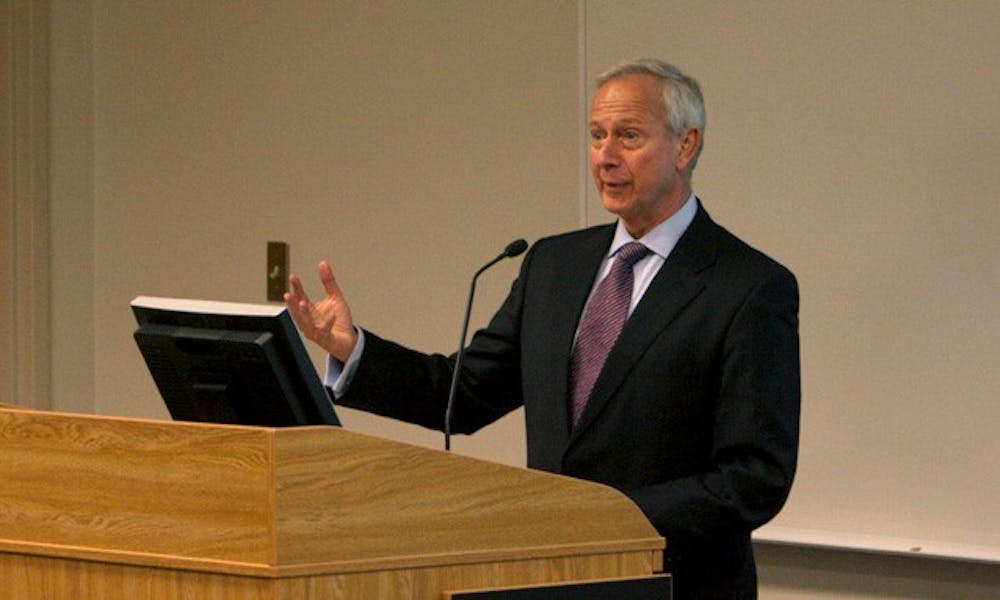Thursday afternoon’s Academic Council meeting deviated slightly from the initial agenda when President Richard Brodhead gave an impromptu speech.
In light of the recent allegations that cyberattacks on Google and other American companies were related to Shanghai Jiao Tong University, Brodhead addressed Duke’s partnership with the Chinese university at the request of Academic Council Chair Craig Henriquez, professor of biomedical engineering and computer science. Duke’s partnership with SJTU, which will allow the two universities to collaborate on mutual educational interests, was finalized Jan. 25.
“Duke has a further relationship to Shanghai Jiao Tong, which is in order to advance with our campus in Kunshan... we needed a Chinese university to cross-endorse our proposal,” Brodhead said. “China won’t let American universities enter without a Chinese partner, and Shanghai Jiao Tong is the university that was to partner with us on that proposal. So I actually believe the educational case for our partnership with Shanghai Jiao Tong remains as compelling today as it did in the past.”
Newspapers have reported many possible origins behind the cyberattacks, with some pointing to sources in Taiwan or Ukraine, Brodhead said.
He noted that many sources close to the University—including one in the U.S. Department of State—have told him that there is no further information on the issue and that it is too early to draw a direct connection between SJTU and the cyberattacks. The State Department source also told Brodhead that the only point of concern for Duke would be if the partnership involved technology that may have been utilized in the attacks. Brodhead said the collaboration between the two universities did not involve those technological areas.
Tracy Futhey, vice president for information technology and chief information officer, has spoken with University officials about Duke developing its own computer presence at foreign universities for protection, Brodhead said.
“Let’s be frank, we all knew when we talked about going to Shanghai, that China is not the United States—that it does not embrace all the same values, it does not offer all the same protections to free exchange of ideas,” Brodhead said. “We went to China not because we endorsed every practice of China but [despite] the differences we still thought there was a profound educational value in going.”
After Brodhead’s speech, council members discussed and approved a proposal for a new Masters of Engineering degree. Administered by the Pratt School of Engineering, the professional masters program will focus on preparing students for jobs in the engineering industry.
Jeff Glass, director of Pratt’s Master of Engineering Management program, said the masters program will also help attract more engineering field-related companies to recruit at Duke because of the influx of more engineering students.
In other business:
The council heard a proposal from Dr. Michael Cuffe, vice president for medical affairs of the Duke University Health System, to transition orthopedic surgery from a division in the Department of Surgery into its own separate department. The council will vote on the proposal at its next meeting.
According to criteria set by the School of Medicine, any division changing into a department must have a set national model, a significant amount of ongoing clinical practice, significant funding, an approved graduate training program and minimal financial impact on other departments, Henriquez said.
In his presentation, Cuffe addressed the criteria and noted that Dr. Victor Dzau, chancellor for health affairs and president and chief executive officer of the DUHS, Dr. Nancy Andrews, vice chancellor for academic affairs and dean of the School of Medicine and the Clinical Sciences Faculty Council have expressed their support for the transition.
Council members also discussed the proposed Duke Open Access policy, which would allow the legal foundation to collect all scholarly works by Duke academics in a permanent digital repository.
Some professors questioned the costs that would go into creating the repository and its practicality.
“If we don’t know the architecture, we can’t even begin to estimate the cost,” said Provost Peter Lange. “I don’t think this is going to happen tomorrow. I think what’s being asked here is ‘Is there a commitment to the philosophy of open access, and ... [will] our faculty live up to the institutional commitment of open access?’”
Get The Chronicle straight to your inbox
Signup for our weekly newsletter. Cancel at any time.

